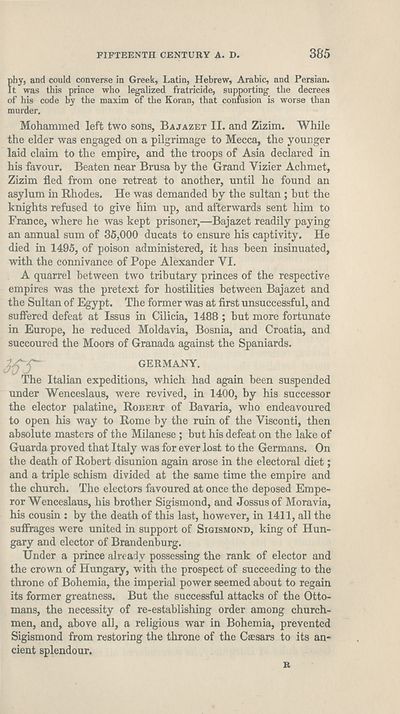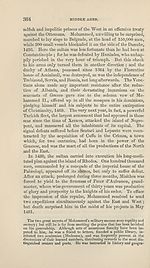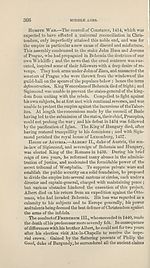Download files
Complete book:
Individual page:
Thumbnail gallery: Grid view | List view

FIFTEENTH CENTURY A. D.
385
phy, and could converse in Greek, Latin, Hebrew, Arabic, and Persian.
It was this prince who legalized fratricide, supporting the decrees
of his code by the maxim of the Koran, that confusion is worse than
murder.
Mohammed left two sons, Bajazet II. and Zizim. While
the elder was engaged on a pilgrimage to Mecca, the younger
laid claim to the empire, and the troops of Asia declared in
his favour. Beaten near Brusa by the Grand Vizier Achmet,
Zizim fled from one retreat to another, until he found an
asylum in Rhodes. He was demanded by the sultan; but the
knights refused to give him up, and afterwards sent him to
France, where he was kept prisoner,—Bajazet readily paying
an annual sum of 35,000 ducats to ensure his captivity. He
died in 1495, of poison administered, it has been insinuated,
with the connivance of Pope Alexander VI.
A quarrel between two tributary princes of the respective
empires was the pretext for hostilities between Bajazet and
the Sultan of Egypt. The former was at first unsuccessful, and
suffered defeat at Issus in Cilicia, 1488 ; but more fortunate
in Europe, he reduced Moldavia, Bosnia, and Croatia, and
succoured the Moors of Granada against the Spaniards.
GERMANY.
The Italian expeditions, which had again been suspended
under Wenceslaus, were revived, in 1400, by his successor
the elector palatine, Robert of Bavaria, who endeavoured
to open his way to Rome by the ruin of the Visconti, then
absolute masters of the Milanese ; but his defeat on the lake of
Guarda proved that Italy was for ever lost to the Germans. On
the death of Robert disunion again arose in the electoral diet;
and a triple schism divided at the same time the empire and
the church. The electors favoured at once the deposed Empe¬
ror Wenceslaus, his brother Sigismond, and Jossusof Moravia,
his cousin : by the death of this last, however, in 1411, all the
suffrages were united in support of Sigismond, king of Hun¬
gary and elector of Brandenburg.
Under a prince already possessing the rank of elector and
the crown of Hungary, with the prospect of succeeding to the
throne of Bohemia, the imperial power seemed about to regain
its former greatness. But the successful attacks of the Otto¬
mans, the necessity of re-establishing order among church¬
men, and, above all, a religious war in Bohemia, prevented
Sigismond from restoring the throne of the Caesars to its an¬
cient splendour.
385
phy, and could converse in Greek, Latin, Hebrew, Arabic, and Persian.
It was this prince who legalized fratricide, supporting the decrees
of his code by the maxim of the Koran, that confusion is worse than
murder.
Mohammed left two sons, Bajazet II. and Zizim. While
the elder was engaged on a pilgrimage to Mecca, the younger
laid claim to the empire, and the troops of Asia declared in
his favour. Beaten near Brusa by the Grand Vizier Achmet,
Zizim fled from one retreat to another, until he found an
asylum in Rhodes. He was demanded by the sultan; but the
knights refused to give him up, and afterwards sent him to
France, where he was kept prisoner,—Bajazet readily paying
an annual sum of 35,000 ducats to ensure his captivity. He
died in 1495, of poison administered, it has been insinuated,
with the connivance of Pope Alexander VI.
A quarrel between two tributary princes of the respective
empires was the pretext for hostilities between Bajazet and
the Sultan of Egypt. The former was at first unsuccessful, and
suffered defeat at Issus in Cilicia, 1488 ; but more fortunate
in Europe, he reduced Moldavia, Bosnia, and Croatia, and
succoured the Moors of Granada against the Spaniards.
GERMANY.
The Italian expeditions, which had again been suspended
under Wenceslaus, were revived, in 1400, by his successor
the elector palatine, Robert of Bavaria, who endeavoured
to open his way to Rome by the ruin of the Visconti, then
absolute masters of the Milanese ; but his defeat on the lake of
Guarda proved that Italy was for ever lost to the Germans. On
the death of Robert disunion again arose in the electoral diet;
and a triple schism divided at the same time the empire and
the church. The electors favoured at once the deposed Empe¬
ror Wenceslaus, his brother Sigismond, and Jossusof Moravia,
his cousin : by the death of this last, however, in 1411, all the
suffrages were united in support of Sigismond, king of Hun¬
gary and elector of Brandenburg.
Under a prince already possessing the rank of elector and
the crown of Hungary, with the prospect of succeeding to the
throne of Bohemia, the imperial power seemed about to regain
its former greatness. But the successful attacks of the Otto¬
mans, the necessity of re-establishing order among church¬
men, and, above all, a religious war in Bohemia, prevented
Sigismond from restoring the throne of the Caesars to its an¬
cient splendour.
Set display mode to:
![]() Universal Viewer |
Universal Viewer | ![]() Mirador |
Large image | Transcription
Mirador |
Large image | Transcription
| Antiquarian books of Scotland > Education > Elements of universal history on a new and systematic plan > (405) |
|---|
| Permanent URL | https://digital.nls.uk/127585000 |
|---|
| Description | Thousands of printed books from the Antiquarian Books of Scotland collection which dates from 1641 to the 1980s. The collection consists of 14,800 books which were published in Scotland or have a Scottish connection, e.g. through the author, printer or owner. Subjects covered include sport, education, diseases, adventure, occupations, Jacobites, politics and religion. Among the 29 languages represented are English, Gaelic, Italian, French, Russian and Swedish. |
|---|

